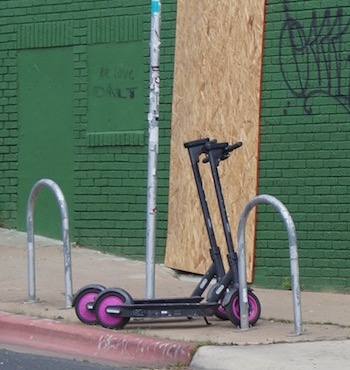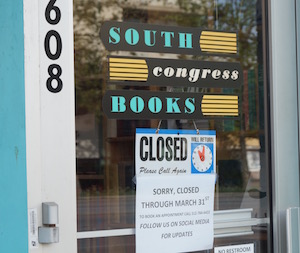Unemployment claims in Texas began to rise in the week of March 8-14, as worry over the coronavirus began to affect sales at retailers and restaurants. That week 19,968 Texans filed claims, an increase of more than 7,000 compared to the same week last year.
But the flood gates opened the next week, March 15-21: 155,657 Texans filed for unemployment benefits, according to the Bureau of Labor Statistics — an eightfold increase.
That spike in layoffs coincided with mandatory closures of restaurants, bars, and other ‘non-essential’ businesses in Houston, Central Texas, and North Texas.
Nationwide, a record 3.28 million workers applied for unemployment benefits last week, putting the economy on track for the highest unemployment rate in over three decades.
Some economists and forecasters are hoping for a quick recovery after a shutdown of just a few weeks. Ben Bernanke, an economist and former Federal Reserve chairman, said on CNBC that he expects “a very sharp, short recession,” followed by a “fairly quick rebound.”
Such hopes fueled a huge rebound on the Dow Jones stock index Tuesday through Thursday, making for the biggest three-day percentage gain since 1931.
But others fear that a prolonged shutdown of businesses would trigger a downward spiral of effects that would be difficult to recover from. If small businesses fail, short-term layoffs could become permanent ones, consumer demand will drop, the real estate market could nose-dive, and banks will get hit with a wave of business and consumer loan defaults.
In that scenario, the worst is still yet to come. The Perryman Group, an economic consultancy in Waco, today released a report projecting a loss of one million jobs in Texas, including about 77,000 jobs in the Austin-Round Rock-Georgetown statistical area. The forecasters used data from areas where the pandemic spread earlier, as well as data on prior pandemics and natural disasters, to guide their assumptions.
According to the Perryman projection, the hardest hit sector in Texas will be retail (including restaurants), accounting for about 423,000 jobs lost. Construction, manufacturing, and energy also would shed hundreds of thousands of jobs. Those numbers represent jobs lost permanently, not just temporary layoffs.
Construction
Houston and Dallas have classified construction as ‘essential’ business, allowing it to continue. But Austin took the opposite approach, allowing only certain projects to continue, such as public works construction and construction on medical facilities.
In a joint letter March 25, the Austin Chamber of Commerce, Home Builders Association of Greater Austin, and Associated General Contractors urged a reversal of this decision and warned that “the long-lasting fallout from completely stopping all projects in the middle of construction will be hard, if not impossible, to bounce back from.”
For some construction workers, the layoffs may be temporary. Well-funded developers will be eager to get construction timelines back on track after restrictions are lifted. But some overly indebted developers, or those who were building homes or office buildings that are no longer in demand, may find it uneconomical to resume construction.
Hospitality
Downtown Austin hotels took a big hit when South By Southwest was cancelled, and the festival organization itself laid off 60 workers early this month.
But now even routine business and leisure travel is on hold, leaving hotels deserted. Marriott hotels are furloughing thousands of employees, while others are laying off staff outright. “They let us all go,” said a worker at a North Austin hotel. “Even a guy who had been there 30 years.”
Travel services also have cut staff. Expedia Group laid off at least 100 tech workers in Austin earlier this month.
Tech Startups
Coronavirus could spell the end of a number of scooter companies and other startups that were never profitable to begin with. Lime, the scooter company, is reportedly trying to raise an emergency funding round that values the company at 80% less than what it was worth last year.

Even before the outbreak, the flow of venture capital was starting to slow as investors grew wary of startups like WeWork, which are fast-growing but highly unprofitable.
Now it’s getting even harder for tech entrepreneurs to get funds to execute their ideas. Linda Myers, a part-time worker at MissionBox, a software maker for nonprofits, said her boss called a meeting on March 19. “The CEO kept telling us her growth plans, and she was in another round of raising money. Then she held a meeting and said she wasn’t going to raise more money right now, that the impact of the virus and stock market was significantly impacting nonprofits.”
Myers was laid off. “The loss of income is devastating — more so if I don’t qualify for unemployment,” she said.
Outbound Engine, a marketing and customer engagement company, is laying off 52 employees. “The layoffs are a direct response to COVID-19 and its sea change impact to the financial markets,” said OutboundEngine CEO Marc Pickren in an email to Austin Inno.
Likewise, Yonder, an Austin startup that identifies ‘disinformation campaigns’ online, laid off 18 of its employees, saying the reduction in cost would help the company weather a “tough period.”
Capital Factory, which is itself a venture investor and a co-working space, has furloughed 33 employees, nearly half its workforce.
Oil & Gas
Coronavirus has killed demand for crude oil by grounding airplanes, idling factories, and suspending commuter travel. The nosedive in oil prices is affecting Texas drilling companies and oilfield services companies from the Permian Basin to the Gulf Coast. Halliburton Energy Services on March 23 laid off 3,500 employees in Harris County, according to a notice filed with the Texas Workforce Commission.
Restaurants and Bars
Some restaurants are keeping staff to fulfill takeout orders and delivery, but many restaurants can’t afford to employ hourly workers for weeks at a time without any dine-in revenues. Courtney Briggs, who was laid off from her job as a server and bartender at Salt Traders in Round Rock, said her employer promised to hire back employees after the coronavirus passes.
“Within the first week business went down fast — no one wanted to come out,” she said. “That’s when everyone started to get nervous. We finally closed and it was shell-shocking.” Briggs said she’s cancelled a trip to Disney World with her daughter and is “gathering resources and supplies to keep us afloat until we can all go back to work.”
Brian Kelsey, the research director for the Capital of Texas Media Foundation, estimated that a prolonged shutdown of restaurants into the late spring or summer could result in 15,000 restaurant jobs lost in Travis County, plus about 6,000 jobs in related industries.
Retail

Lizelle Villapondo, the owner of Parts & Labour, an Austin consignment store, says the stay-home order will harm not just her hourly workers but also the dozens of artists who sell goods through her South Congress store. Even before the formal shutdown order came on March 24, Villapondo had already laid off 8 of 11 staff.
Gig Workers
The gig economy has picked up in some areas, such as grocery delivery, but work for many other freelancers — such as musicians, DJs, and caterers — has slowed to a trickle, or dried up altogether. Austin is still allowing rideshares like Uber and Lyft to operate, but the ban on all ‘nonessential’ travel has cut demand to only a meagre sliver of what it is usually.
Public Sector
A slowdown in the Texas economy will impact sales tax revenue and other revenue streams for local governments and the state. That could slow hiring for months or even years. The City of Hutto laid off 48 employees on March 24, though few other cities have cut staff yet.
Hutto City spokesperson Stacy Schmitt told Community Impact Newspaper that the layoffs account for nearly one-third of Hutto’s city staff. “Our city is being challenged during this pandemic, and the city is facing a significant impact to the financial health of the city,” Schmitt said in the email.
Who’s Hiring?
In retail, the coronavirus has accelerated the advantage that big-box retailers and home delivery companies including Amazon have over small brick-and-mortar retailers. H-E-B, Target, Walmart, and Amazon are all hiring, offering bonuses, and other incentives to attract new workers and encourage existing ones to say on through the pandemic.
Workers at Walmart’s e-commerce warehouses are now making $19 an hour, compared to $15 before the outbreak. Grocery delivery company Instacart has announced it will hire 300,000 contract workers over the next three months, more than doubling the size of its staff.
Pharmacy chain CVS plans to hire 50,000 workers across the U.S., and it is offering cash bonuses to employees who work through the outbreak.
Hiring is also picking up at hospitals. According to ZipRecruiter, listings for U.S. nursing jobs spiked 49% from February to March, listings for medical transporters were up 124%, and demand for medical technicians jumped 106%.
